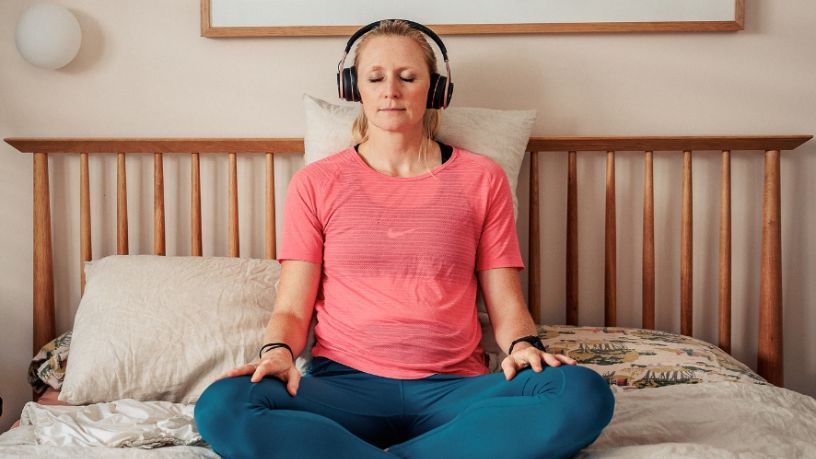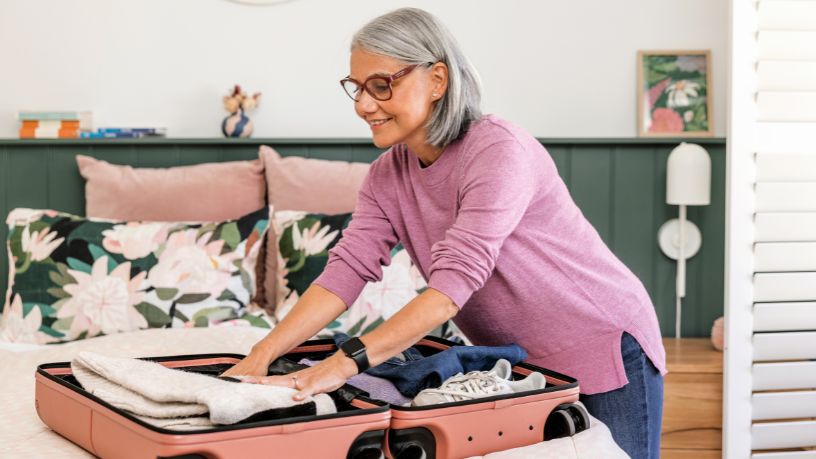Getting enough good-quality sleep is crucial when you're preparing for or recovering from treatment or an operation.
Key takeaways
Hospitals can be loud and bright places, but there are ways to minimise these distractions.
Try these 5 tips for better sleep in hospital.
Hospitals are notorious for loud machines, bright lights and interrupted sleep. And while you might know good quality sleep is important for your energy and mood, research shows it's also key to your recovery after an operation.1
While spending time in hospital can take you out of your comfort zone, there are a few simple hacks you can try to help improve your rest.
Pack essential sleep items
Make sure you plan ahead by packing any essential sleep aids you might need for your stay. This could include:
- an eye mask
- ear plugs
- noise-cancelling headphones
- special pillows or blankets.
You should also pack comfortable sleepwear such as pyjamas and warm socks.
If you're a very sensitive sleeper, you might also consider levelling things up with a white noise app on your phone or even by purchasing earbuds that are specially designed for sleeping.
Make sure your hospital bed is suited to your body
Hospital beds are designed to help your body recover following an operation or treatment and make it easier for staff to look after you. But they're also standardised, so while some people might find them comfortable, others won't. If you're not getting a proper rest in your hospital bed, there are things you can do to improve it.
If you have a pillow or blanket that helps you sleep at home, bring it along during your stay. This can provide you with the support your body's used to and give you a sense of familiarity in your new, temporary environment. Hospital staff may also be able to provide you with a pressure-relief overlay, which can help you readjust your body on the bed.
Try to stick to your normal sleep cycle
Your body has its own internal clock that tells it when to do things like eat and sleep. This circadian rhythm is influenced by your environment, diet and routine. And when it comes to sleep, sticking to a regular cycle will help you nod off better.2
To help establish a consistent sleep-wake cycle, try building a few pre-bedtime habits in the weeks and months before you go to hospital. These could include:
- going to bed at the same time every night
- waking up at the same time every morning
- avoiding screens before you go to sleep
- ensuring your room is dark and cool.
Continuing this routine at hospital could help you stick to your normal sleeping habits.
You should also try to use the bathroom before going to bed to avoid getting up in the night.
Practise pre-sleep mindfulness
There are a range of mindfulness principles you can practise if you're trying to improve your sleep. These include:3
- approaching each sleep with a clear mindset. This means not carrying your thoughts and anxieties from the previous night to tonight, and not allowing yourself to believe that you won't be able to sleep.
- adopting a non-striving approach to sleep. You can't force sleep, and falling asleep is never the result of mental effort. Letting go of that control may help you to relax.
- not judging yourself. We all have trouble sleeping from time to time, especially in a new environment. Don't feel guilty about this or like you're doing something wrong.
- acknowledging your sleeping difficulty. Sometimes, simply acknowledging a problem can help you work towards resolving it.
- trusting your body and mind, and being patient. Good sleep will usually happen when you're comfortable with both your environment and yourself.
Avoid thinking about falling asleep and let it just happen. As well as keeping these principles in mind, you might also practise a few relaxation and wellness techniques before you go to sleep. These include meditation, breathwork and gentle stretches.
Tell staff if something’s not right
If you're recovering from a medical procedure or treatment, you might experience some pain or discomfort. While your treating team may give you medication to deal with this as needed, it's also important that you talk to hospital staff if you have any additional concerns.
Maybe you're not warm enough, or maybe there's too much light in your room. Whatever it is, they're there to support your comfort and recovery and get you healthy as quickly as possible.
With a little preparation and planning, you might be able to create a calmer, more peaceful sleep environment to better support your recovery.

At Bupa, trust is everything
Our health and wellbeing information is regularly reviewed and maintained by a team of healthcare experts, to ensure its relevancy and accuracy. Everyone's health journey is unique and health outcomes vary from person to person.
This content is not a replacement for personalised and specific medical, healthcare, or other professional advice. If you have concerns about your health, see your doctor or other health professional.
1Sipilä, R. M., & Kalso, E. A. (2021). Sleep Well and Recover Faster with Less Pain-A Narrative Review on Sleep in the Perioperative Period. Journal of Clinical Medicine, 10(9), 2000.
2National Institute of General Medical Science. (2023). Circadian Rhythms. National Institutes of Health.
3Sleep Health Foundation. (2025). Mindfulness and Sleep. Sleep Health Foundation.
You might also like...
Tips to help you fall asleep
Small changes to your evening routine could have you falling asleep faster and sleeping better.
Bedtime meditation: The benefits to health and sleep
If you have a hard time falling asleep, meditating before you head to bed could help relax your body and mind. So how does it work?
What to pack when you're going to hospital
Going to hospital can be stressful, but packing a few handy essentials and some of your favourite items can make your stay more comfortable and relaxing.
9 ways to make your hospital stay more enjoyable
A hospital stay probably isn’t your idea of a dream getaway, but with a few easy hacks it can be more enjoyable.





